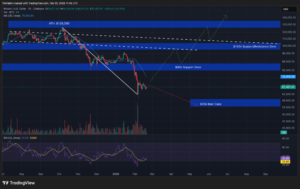Last updated:
 Why Trust Cryptonews
Why Trust Cryptonews
Ad Disclosure
We believe in full transparency with our readers. Some of our content includes affiliate links, and we may earn a commission through these partnerships. Read more

Solana-based decentralized exchange (DEX) aggregator Jupiter fell victim to a security breach on Wednesday, with its official X account being compromised to promote fraudulent meme cryptocurrencies.
The team quickly alerted the community, warning users not to engage with any suspicious links.
Jupiter Mobile, the project’s official handle, confirmed the breach, stating that the team was working to regain control.
“The main Jupiter Exchange account has been compromised,” Jupiter Mobile’s X handle wrote in a post, warning social media users not to click links. “Team is working on restoring access.”
Despite efforts to contain the situation, the hacker continued posting under the compromised account, initially promoting a fake token called $MEOW, a reference to Jupiter’s pseudonymous co-founder, Meow.
Screenshots shared on social media revealed the scam before the posts were deleted.
Crypto venture firm GM Capital founder, Beanie, highlighted the scale of the losses, claiming that traders lost millions within minutes of the hack.
The incident raised concerns about security lapses, with some questioning how protocols managing billions in liquidity could fail to protect their social media accounts.
As the attack unfolded, multiple users on X reported losing their Solana (SOL) tokens after engaging with the fraudulent promotions. The situation worsened when the hacker began promoting another fake token, $DCOIN, further amplifying the damage.
Meanwhile, Jupiter’s founder, known as @weremeow on X, expressed deep concerns over the nature of the breach, suggesting it could be more than just an online hack.
He speculated that Mei, a key Jupiter team member involved in the Jupuary airdrop, may have been physically targeted.
Mei, a recognizable figure in the crypto community, had recently been at MtnDAO, a gathering for blockchain developers, before flying home due to a family emergency.
Shortly after, the Jupiter X account was accessed from an Android device using in-flight WiFi, and Mei became unreachable.
The founder suggested that this could indicate something more serious than a routine cyberattack.
Despite the alarming situation, Jupiter assured users that funds remained secure, as the platform does not hold custody over user assets.
The project’s treasury and contract upgrades are protected by a globally distributed multisig system, eliminating risks to core operations.
“We hold zero custody of user funds, all our key treasury and contracts upgrades are controlled by a globally distributed multisig, so there’s no risk on that front at all,” the founder wrote.
Crypto Market Lost $1.49B to Hacks in 2024
As reported, the crypto industry witnessed losses totaling $1.49 billion in 2024 due to hacks and fraud, marking a 17% decrease from 2023.
According to a report by blockchain security platform Immunefi, hacks were overwhelmingly the primary cause, accounting for $1.47 billion or 98.1% of the total losses across 192 incidents.
Fraud, including rug pulls and scams, represented just 1.9% of the losses at $28 million, though this category saw a 72% increase year-on-year.
The decline in total crypto losses reflects improved security measures, as the number of successful attacks also fell by 27.5%, from 320 in 2023 to 232 in 2024.





















